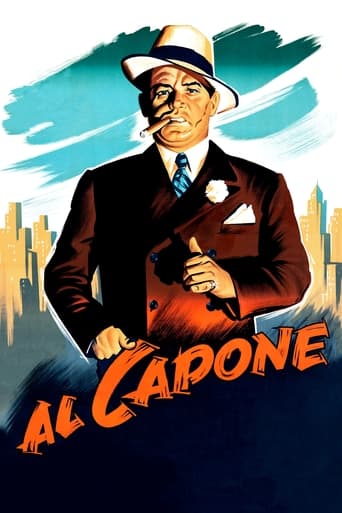Tom Groening
Like so many mid-century biographical films, Al Capone marches through the man's life, giving equal weight to each way-point. It also fails miserably by providing no psychological or historical context for how he became one of crime's most notorious characters. In fact, the film succeeds in white-washing this killer. He woos the widow of one of his victims. He repeatedly makes the point that he's never been convicted of any crime. People die, but there is no depiction of Capone's ruthless, brutal side. Rod Steiger in the title role does an admirable job with the shallow script, but this is not enough to make the film worth watching. Oddly, there's no mention of Elliot Ness and when it comes to summing up Capone's end, we're told he died of "an incurable disease." What, audiences in 1959 couldn't handle the word "syphilis"?
Edgar Soberon Torchia
In Richard Wilson's "Al Capone", there is a commodore who arrives to Capone's mansion in Florida. He seems to be a "distinguished" citizen, probably a member of the local aristocracy; and he is glad to be associated with Capone. The character —introduced by scriptwriters Henry F. Greenberg and Marvin Wald— is not paid too much attention, but he is a key figure if one tries to make a deeper analysis of the economy of any society or country. In the end, Greenberg and Wald opt for moralizing, and warn about an economic pattern Capone supposedly introduced in American society, which is still in effect. Nothing is said about those hidden "commodores" who use people as ruthless as Capone —in favor of or opposed to the law—, persons who are only "wild cards", jokers in a game the "commodores" of the world play from the top, where ordinary people seldom see them. So, "Al Capone" results an interesting and entertaining piece of filmmaking, made efficiently by Wilson with top professionals (cinematographer Lucien Ballard, art director Hilyard Brown, composer David Raksin, and an impressive cast), and a script that tries to be as faithful as possible to facts more or less known by the audience, but superficial in its study of the man, and the main variables that influenced his life, from a bio-psycho-social perspective. It is in the same vein as Howard Hawks' "Scarface", although, as declared by Hawks, he was not trying to make a biography of Capone, but rather show how the world of gangsters resembled the behavior and logic of children's play.
st-shot
Rod Stieger slices the salami pretty thick in this fairly accurate but uninspired retelling of the career of infamous Chicago mobster Al Capone. Stieger is one massive harangue as he violently bullies his way to the top eliminating any and all obstacles with a hyperbolic intensity as abrasive as the farrago of machine gun fire that permeates this noisy but stolid gangster flick.Predating the very similar in topic and tone Untouchables television series that would be released in the Fall of the same year Capone's historical integrity is supplied by voice over narration while most of the cast follows Rod's over the top posturings chewing scenery.Richard Wilson's direction makes no attempt to reign in Stieger and the economical production values don't allow for much in the way of composition which depends mostly on medium shot and close-ups to masque what is basically an extended version of the Ness show which provided a more modulated Scarface (Neville Brand) and a narrator for the ages, Walter Winchell, spitting detail as rapidly as Big Al's burp guns.
Coxer99
Rod Steiger electrifies the screen in this dramatization of the famed gangster's life, which traces his rise from small time hood to larger than life crime boss. Better than any other film made about the legendary mob boss. Martin Balsam also co-stars.



